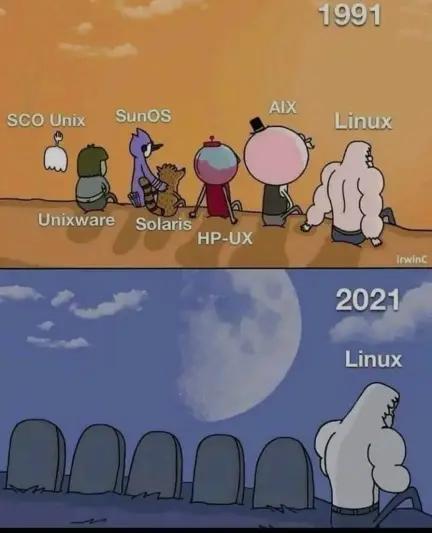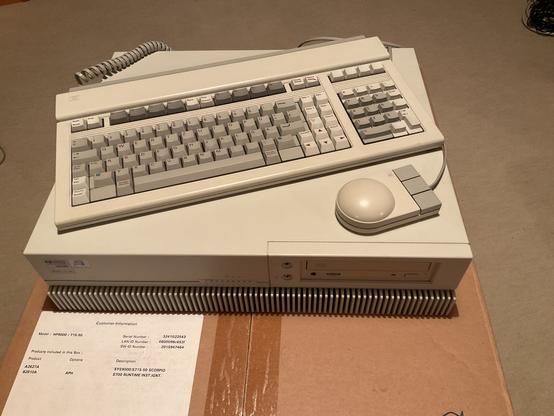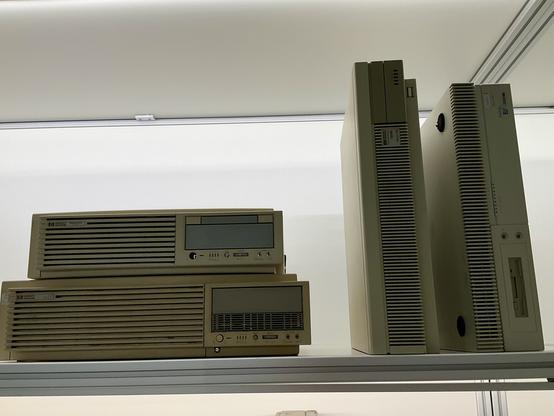@OpenPA Lovely thread! Had both a C8000 and a RX2600 10 years ago running #RHEL, #HPUX and #OpenVMS 🤩
#hpux
I love old unixy nostalgia projects, but #CDE never grabbed me by the heartstrings (or brainstrings). I used it a bit with #HPUX back in the early 2000s. It always felt like "We have IRIX at home." ;)
I have seen the modern recreation of IRIX, the MAXX Creative Desktop. While it's pretty, it lacks a lot of the custom/proprietary IRIX tools that made IRIX so groovy, I think.
⇢ What I find more surprising is that the 720 was actually a little too slow to run HP-VUE smoothly, which makes me wonder how it ran on 68K-based machines…
So people typically used either twm or HP-VUE Lite. There seems to be hardly any information online about the latter (apart from the documentation https://archive.org/details/bitsavers_hp9000hpuxalUserEnvironment3.0UsersGuideJul92_34368808/page/n493/mode/1up), but it was really almost the best of both worlds, i.e., fast and esthetically pleasing.
□
Crazy, I’m posting about 100BaseVG and HP-VUE on the same day!
So, one more thought… Back in the day, we ran a DUX (diskless cluster) of about a dozen Snakes (HP9000/720) over 10Base2. They had disks for local swap and scratch space (context-dependent files, anybody?) and ran #HPUX 9.
And it worked fine. Booting all machines at the same time obviously was slow, but there was rarely any need to reboot them at all. ⇢
#plptools update!
Haiku
The #HaikuOS port is now mostly working, with caveats. Everything compiles except plpfuse, which might require migrating plpfuse to FUSE3. I've been able to send and receive files using plpftp, but RS232 DSR checking has to be disabled in the code. I don't want to speak too soon as it could very well be my mistake, but there might be a bug in Haiku's implementation of ioctl() for serial ports. Stay tuned...
FreeBSD
The #FreeBSD port currently has issues with linking to readline, but I'm sure that's fixable. However, a different issue has come up involving FreeBSD's implementation of the timezone global variable. This, in turn, might have uncovered some very old, slightly iffy code when working out timezone offsets.
Other platforms
The #macOS port is running fine at the moment, thanks to @captfab and @jbmorley's sterling work. If you're on macOS, check out Reconnect.
I'd like to resurrect the #NetBSD port for a few reasons, not least because you can still run the current release of NetBSD on a Series 5. I have no experience with NetBSD, so that's my challenge for this afternoon.
There are indications that plptools has at some point worked on #HPUX, #IRIX and #AIX. I personally feel that these ports probably don't need to be resurrected.
The code also mentions #Solaris - I'd certainly consider working on an #IllumOS port, if people were interested.
Interestingly, there's no mention of #OpenBSD, but again I would consider working on that if people are interested.
This is very much a *NIX/POSIX suite of tools. A Windows port isn't going to happen any time soon, unless someone wants to try building it using cygwin. I'm not saying it will never happen, but it's not a priority.
Misc
A couple of small bugs have been squashed by Reuben, including an issue where logging didn't go to stdout when using the --autoexit switch.
What NEXTSTEP utilizes on the HP PA-RISC-based "Gecko" systems is far more intriguing and bizarre, as far as desktop color rendering.
My HP 9000 712/60 “Gecko” Workstation Featuring HP “Color Recovery” Technology -- https://bytecellar.com/2005/02/09/my_hp_9000_7126/
Experiences with #dreckly / #pkgsrc on obscure Unixes:
#UnixWare - bootstrap succeeded! Just needed a few simple fixes.
#OpenServer - see UnixWare.
#BSDOS - kernel panic during installation. Support incomplete.
#HPUX - kernel panic during installation.
#QNX - bootstrap success! No changes needed.
#Haiku - bootstrap failed due to open() behaviour. "Invalid argument".
If you have a shell on an #IRIX or #HPUX machine, please let me know!
My 2004 tape memories has to do with wondering why the DDS-IV tape drive on the one little #HPUX server I administered (as an infosec analyst who obviously was the last person to step backward when they handed out the assignment) had such a small capacity.
I went back and forth with the proper sysadmins about it until I showed them a tape, and they were like: "That's not DDS-IV, goofball, that's just plain DDS (one)!"
"BUT THEN WHY DOES IT SAY 'DDS IIII' ON THE TOP OF THE TAPE?!?!???" 🤣
i was talking to @erutan and trying to impress him by talking about how bad-ass my zshrc is cuz of some os detection routines i used so that regardless of what #OS i was logged into my aliases and commands all worked the same way so i wasn't headdesking repeatedly.
some of my commentary in there is cracking me up though. for example in the #HPUX section: `kill me now.` apparently i've never cared for hpux. i prefer DU or AIX even and i don't like them either.
I love vi mode. It's all I use! For 20+ years!
I was forced to use it by #HPUX's ksh way back when, because it didn't have a tab completion mode. It was just vi mode, using double-escape for completion (weird!)
But having the power of vi within the shell was just awesome!
Of course, modern versions have the benefit of tab completion AND vi keystrokes. Huzzah! ;)
I finally put together the compatibility shims I used a year ago to make modern GNU software compile on #HPUX 11.11.
If you need that, then
a. you are crazy,
b. look here: https://gist.github.com/vidraj/2267181fd7d1fef8cdd6f834f5f40716
@earl I've heard it said that if Packard had insisted on his name going before Hewlett's in the company name, it would have made the name of #HPUX far more accurate.
On the other hand I've heard it said that #AIX is the #Unix from the universe where Spock has a beard. None of the commercial Unixes are universally loved, it seems.
This quote accurately summarizes my feelings and experience in the BSD & Linux & UNIX worlds over the past quarter-century of usage for work and adventurous daily driving.
> BSD is what you get when a bunch of Unix hackers sit down to try to port a Unix system to the PC.
> Linux is what you get when a bunch of PC hackers sit down and try to write a Unix system for the PC.
(Encountered somewhere online recently... attribution unknown.)
I’m going to visit my parents next week, and this would be a good opportunity for me to bring my 715/50 back with me, so I could hopefully fix the power supply.
But while the machine itself wouldn’t be too big or too heavy to take it on the train, its original box is about twice its size :-(
Regrettably, the Enter museum has many more SGI than HP workstations on display (sure, they do look nice!). I just wanted to write that they have at least representatives of all case types that I’ve used—but in fact, I’ve also used J class and the later B class machines.
when your workstation doesn’t know it’s server and you don’t have a keyboard. you literally cannot <ESCAPE>


